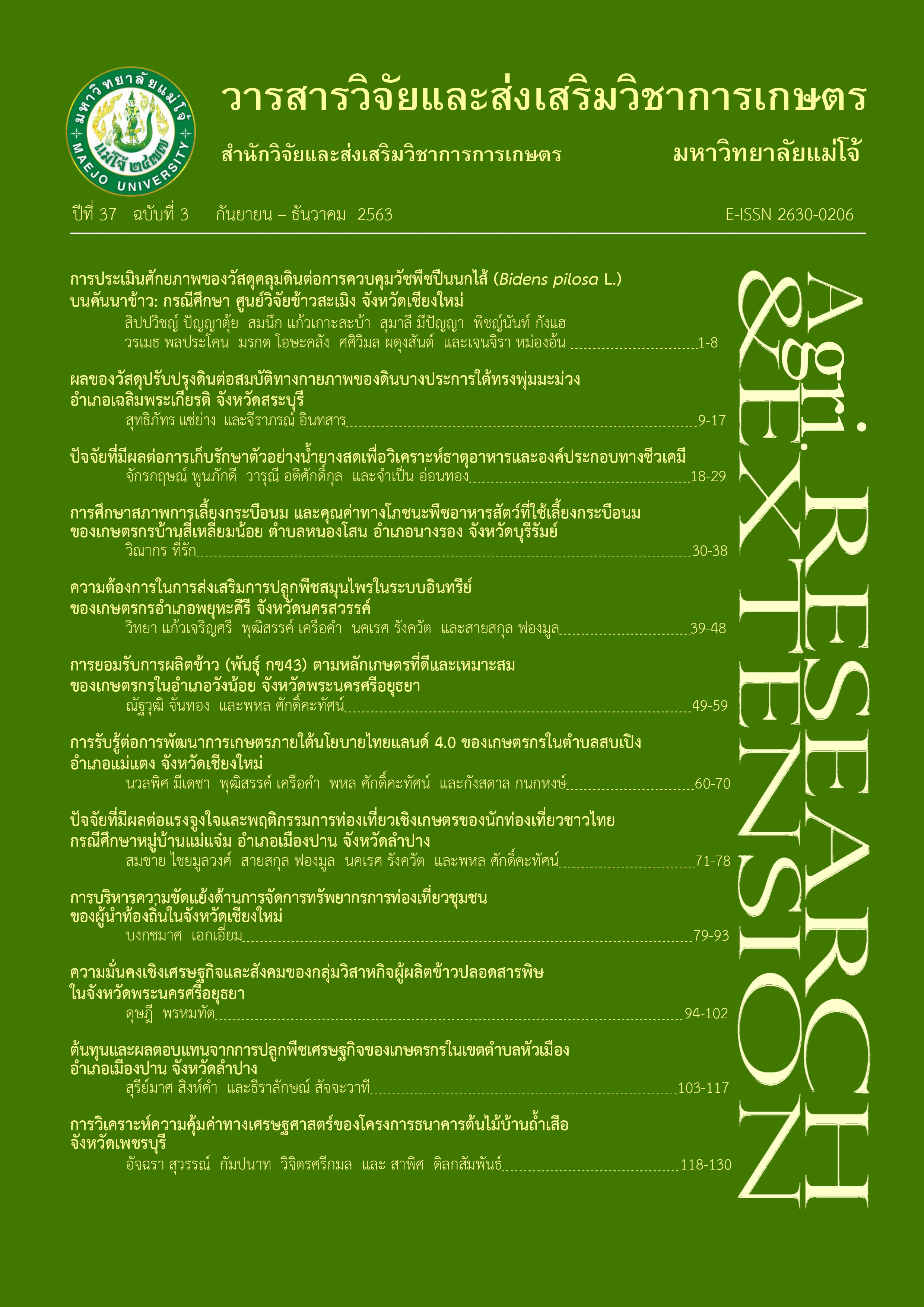การบริหารความขัดแย้งด้านการจัดการทรัพยากรการท่องเที่ยวชุมชน ของผู้นำท้องถิ่นในจังหวัดเชียงใหม่
คำสำคัญ:
การบริหารความขัดแย้ง, การท่องเที่ยวชุมชน, การจัดการทรัพยากรการท่องเที่ยว, ผู้นำท้องถิ่นบทคัดย่อ
ผู้นำชุมชนท้องถิ่นเป็นผู้มีบทบาทสำคัญในการบริหารความขัดแย้งด้านทรัพยากรการท่องเที่ยวภายในชุมชน โดยผู้นำแต่ละคนอาจเลือกวิธีการบริหารความขัดแย้งในลักษณะที่แตกต่างกัน ทั้งนี้ขึ้นอยู่กับลักษณะบทบาทของตัวผู้นำเอง สาเหตุ/ปัจจัยความขัดแย้ง และสถานการณ์ความขัดแย้ง การศึกษาครั้งนี้จึงมีจุดมุ่งหมายเพื่อ ศึกษาความขัดแย้งและรูปแบบการบริหารความขัดแย้งในการจัดการทรัพยากรการท่องเที่ยวชุมชนของผู้นำท้องถิ่น อันจะนำไปสู่การนำเสนอแนวทางและ ตัวแบบการบริหารความขัดแย้งที่เหมาะสมในการจัดการทรัพยากรการท่องเที่ยวภายในชุมชน เพื่อการใช้ประโยชน์ร่วมกันอย่างยั่งยืน ซึ่งการศึกษานี้ใช้แนวคิดการบริหารความขัดแย้งในการกำหนดกรอบแนวคิดการวิจัย และใช้ระเบียบวิธีวิจัยทั้งเชิงปริมาณและเชิงคุณภาพในการเก็บรวบรวมข้อมูลและการวิเคราะห์ข้อมูล ผลการวิจัยพบว่า ชุมชนมีความขัดแย้งด้านการจัดการทรัพยากรการท่องเที่ยวชุมชนในระดับปานกลาง ในขณะที่ผู้นำเห็นว่าชุมชนมีความขัดแย้งด้านลักษณะโครงสร้างของชุมชน มากที่สุด รองลงมาคือ ข้อบังคับของหน่วยงานราชการกับการดำเนินการภายในที่ไม่สอดคล้องกัน ประชาชนเห็นว่า ความขัดแย้งเกิดจากเป้าหมายและความคาดหวังของคนในชุมชนแตกต่างกัน รองลงมาคือ ลักษณะโครงสร้างของชุมชน โดยทั้งผู้นำและประชาชนต่างมีความเห็นสอดคล้องกันว่า ผู้นำควรมีการบริหารความขัดแย้งใน 5 รูปแบบ คือ 1) การใช้อำนาจ 2) การหลีกเลี่ยง 3) การประนีประนอม 4) การเอื้ออำนวย และ 5) ความร่วมมือกัน สำหรับแนวทางการบริหารความขัดแย้งที่เหมาะสมขึ้นอยู่กับสถานการณ์หรือปัญหาของความขัดแย้ง อย่างไรก็ตาม การบริหารความขัดแย้งโดยความร่วมมือกันของผู้ที่มีส่วนได้ส่วนเสียทุกภาคส่วน คือทางออกที่ดีที่สุดของความขัดแย้งด้านทรัพยากรการท่องเที่ยว ส่วนปัจจัยที่สนับสนุนให้การบริหารความขัดแย้งประสบผลสำเร็จ ได้แก่ ภาวะผู้นำ การมีส่วนร่วมของชุมชนในการจัดการทรัพยากร ความสัมพันธ์อันดีของคนในชุมชน และวัฒนธรรมชุมชน
เอกสารอ้างอิง
Charoensiri, W. 2011. Conflict Management in Public Lands in Mahasarakham Province. Master Thesis. Rajabhat Rajanagarindra University. 238 p. [in Thai]
Chevasiri, N. 2001. Strength of Community-Based Natural Resource Management: A Case Study of Ban Ta Pong, NongHarn Sub-district San Sai District Chiang Mai Province. Master Thesis. Chiang Mai University. 98 p. [in Thai]
Chiang Mai Provincial Office. 2017. Chiang Mai Briefing: General Information of Chiang Mai Province. Publication Documents. Chiang Mai: Strategy and Information Group for Provincial Development. 20 p. [in Thai]
Chompunth. C. 2017. Environmental conflict management: A case study of the thermal coal fired power plant project in Rayong province. Kasetsart Journal of Social Sciences 38(3): 692-703.[in Thai]
Cronbach, L.J. 1951. Coefficient alpha and the internal structure of tests. Psychometrika 16(3): 297-334.
Ek-Iem, B. 2019. Local community leadership and participative management for sustainable use of resources and environment in tourism attraction communities in Chiang Mai. Journal of Agricultural Research and Extension 36(3): 102-113. [in Thai]
Ganjanapan, A. 2000. Community Dynamics in Resource Management: Paradigms and Policies. Bangkok: The Thailand Research Fund. 559 p. [in Thai]
Graham, P. (eds). 2003. Mary Parker Follett Prophet of Management. Washington D.C: Beard Books. 309 p.
Jittasathien, P. 2010. Solving the political violence in Thailand found a dead end?King Prajadhipoks Institute Journal 8(1): 28-38. [in Thai]
Katz, D. 1964. Approaches to Managing Conflict. pp. 105-144. In Kahn R.L. and K.E. Boulding (eds.). Power and Conflict in Organizations. New York: Basic Books.
New Local Government Network. 2005. Making Community Leadership Real. London: NLGN Publication. 22 p.
Office of Tourism and Sports. 2016. Tourism Economic Review 6 (Oct.-Dec. 2016). Bangkok: Ministry of Tourism and Sports. 99 p. [in Thai]
Plathong, P., W. Krisanaputi and S. Langlaa. 2012. Conflict management in the Pahurat communiy of Bangkok. Humanities and Social Sciences 29(3): 41-80. [in Thai]
Sinthipong, U. 2015. Local communities and participation in sustainable management of natural resources. Executive journal 35(1): 104-113. [In Thai]
Sodpiban, P. 2010. Conflict management’s Bangluang market 122 rattanakosin era. Executive Journal 30(3): 191-196. [in Thai]
Thomas, K.W. 1976. Conflict and Conflict Management. pp. 889-935. In Dunnette, M.D. (eds.). Handbook of Industrial and Organizational Psychology. Chicago: Rand McNally.
Thomas, K.W. 1992. Conflict and conflict management: reflections and update. Journal of Organizational Behavior 13(3): 265-274.
Trakarnsirinont, W. 2019. The traffic in Ban Mae Kampong community-based tourism, Huay Kaew sub-district, Maeon district Chiang Mai province. Political Science and Public Administration Journal 10(2): 67-84. [in Thai]
Turner, J.C. 1982. Towards a Cognitive Redefinition of the Social Group. pp. 15-40. In Tajfel, H. (eds.). Social Identity and Intergroup Relations. Cambridge: Cambridge University Press.
Ubali, C. 2015. Conflict management among local community leaders: a case study in Ta Kien Thong sub-district Khitchakoot district Chanthaburi province. Journal of Politics and Governance 5(1): 181-195. [in Thai]
Interviews:
Ming. Village Headman. (2016, February 9).
Jun. Villager. (2016, February 10).
Som. Village Headman. (2016, March 11).
Keaw. Villager. (2016, March 13).
Lam. Sub-district Headman. (2016, March 13).
Pook. Sub-district Headman. (2016, March 13).
Jom. Villager. (2016, March 11).
Discussion Group:.
Community Leaders. (2016, April 15).
ดาวน์โหลด
เผยแพร่แล้ว
รูปแบบการอ้างอิง
ฉบับ
ประเภทบทความ
สัญญาอนุญาต
ลิขสิทธิ์ (c) 2020 วารสารวิจัยและส่งเสริมวิชาการเกษตร

อนุญาตภายใต้เงื่อนไข Creative Commons Attribution-NonCommercial-NoDerivatives 4.0 International License.
บทความนี้ได้รับการเผยแพร่ภายใต้สัญญาอนุญาต Creative Commons Attribution-NonCommercial-NoDerivatives 4.0 International (CC BY-NC-ND 4.0) ซึ่งอนุญาตให้ผู้อื่นสามารถแชร์บทความได้โดยให้เครดิตผู้เขียนและห้ามนำไปใช้เพื่อการค้าหรือดัดแปลง หากต้องการใช้งานซ้ำในลักษณะอื่น ๆ หรือการเผยแพร่ซ้ำ จำเป็นต้องได้รับอนุญาตจากวารสาร





